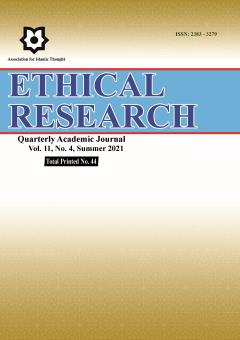-
-
List of Articles
-
Open Access Article
1 - Educational study of the issue of the strength of men over women in the light of the moral teachings of the Holy Quran
Reihaneh Emamjomeh Jafar nekoonam Mehrdad Abbasi -
Open Access Article
2 - Moral conscience and its function on the behavior of judges in the Iranian judicial system
Yahya Jafari Ahmad Reza Khazaei Jamshid Masoumi -
Open Access Article
3 - The Religious Origins of the Ethics of the Ancient Iranians
Khalil Hakimifar Hamid Eskandari -
Open Access Article
4 - Investigating the place of moral values in alimony and the feasibility of abolition of alimony in Iranian jurisprudence and law with a comparative study of American law
Fakhr Afagh Hamidi Seyed Ahmad Ali Hashemi Hossein Naseri Moghaddam -
Open Access Article
5 - The role of the judiciary in the social prevention of crime based on the Iranian-Islamic model of education
Anvar Kheirabadi Javad Niknejad Mohammad Barani Mehdi Ismaili -
Open Access Article
6 - The position of Islamic ethics standards in the field of negative consequences of quoting meaning and its reflection in prophetic narrations
Roohollah Samadi Ali Hossein Ehteshami Seyed Hamid Hosseini -
Open Access Article
7 - Enjoining the good and forbidding the evil in the words of revelation and in the expression of the Prophet and the guardians of God "with a health approach in Islamic life"
Asghar Abedzadeh Andarian -
Open Access Article
8 - Alignment of jurisprudence and ethics with the assumption of observing the limits in corporal punishment of children
Sadegh Fani Maleki Ahmad mirkhalili -
Open Access Article
9 - Moral approach to compensating for the spiritual damage caused by the decline of reason in jurisprudence and Iranian law
Mohammad Ferdosi Pour MOhammadReza Kazemi GolVerdi Hossein Ahmary -
Open Access Article
10 - The role of ethics in the effective marketing process of the home show network
Seyed Nasser Kamali Esmail Hasanpour Ghoroghchi Sirajuddin Mohebbi -
Open Access Article
11 - Examining the moral responsibility and duties of the government towards responsibilities outside the will
Mohsen Lezgi Hossein Saberi Seyed Mohsen Jalali -
Open Access Article
12 - Components of child sexual education from the perspective of educational jurisprudence
Shirin Mohammadi Panah Maryam Aghaie Bajestani Reza Kohsari -
Open Access Article
13 - An analysis on the riddle of the number seventy-five moral propositions in the hadith of wisdom and ignorance
hadi vahdani far Mohammad Davoodi -
Open Access Article
14 - Managerial ethics in Marzbannameh and the advice of the kings
Tavagh Galdi Golshahi -
Open Access Article
15 - Components of power in The Abbasi's caliphate and its consequences
Rasool Akhgar Jalil Pourhassan Darabi Abbas Ashouri Nejad -
Open Access Article
16 - Investigating the relationship between organizational trauma and organizational silence according to the mediating role of managers' emotional intelligence (Case study: Bank Mellat companies)
leila moallemian masoud haghighi Alireza Rezghirostami
-
The rights to this website are owned by the Raimag Press Management System.
Copyright © 2017-2026







